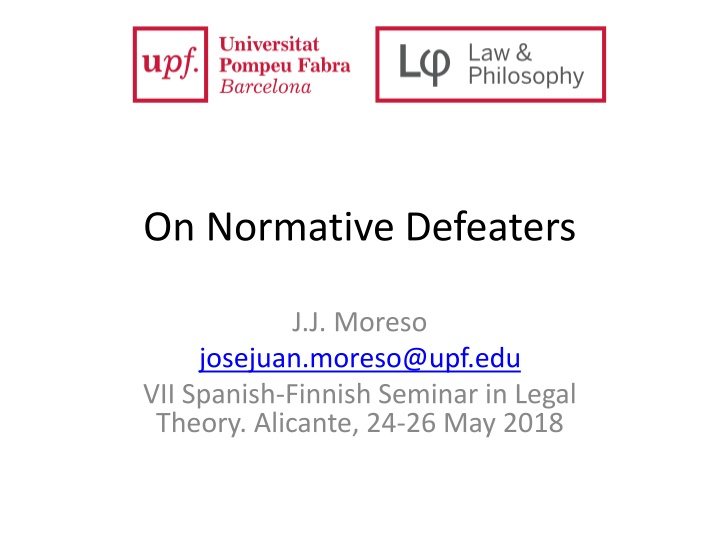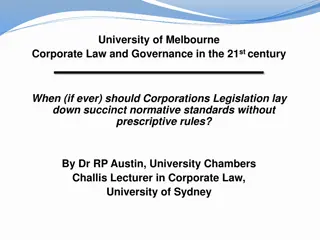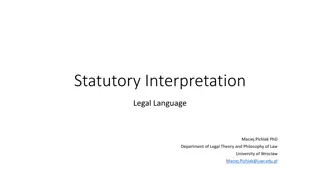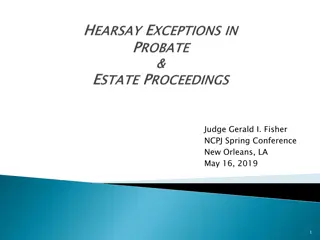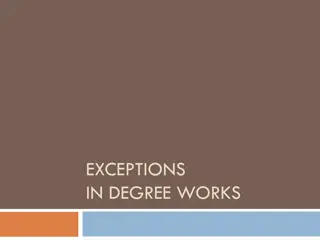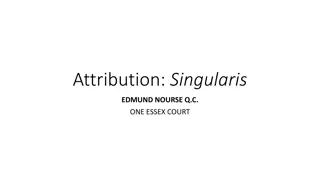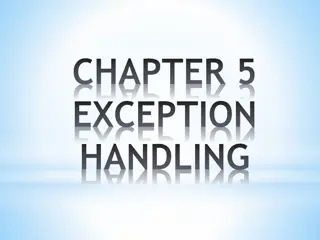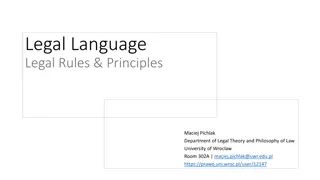Normative Defeaters: A Study on Legal Rules and Exceptions
Exploring the concept of normative defeaters in legal theory, this study delves into the defeasibility and generality of legal rules, using the example of United States v. Kirby to illustrate how sensible construction prevails over literal interpretation. The discussion also touches on generic cases, normative solutions, and the classification of normative defeaters in criminal law.
Download Presentation

Please find below an Image/Link to download the presentation.
The content on the website is provided AS IS for your information and personal use only. It may not be sold, licensed, or shared on other websites without obtaining consent from the author.If you encounter any issues during the download, it is possible that the publisher has removed the file from their server.
You are allowed to download the files provided on this website for personal or commercial use, subject to the condition that they are used lawfully. All files are the property of their respective owners.
The content on the website is provided AS IS for your information and personal use only. It may not be sold, licensed, or shared on other websites without obtaining consent from the author.
E N D
Presentation Transcript
On Normative Defeaters J.J. Moreso josejuan.moreso@upf.edu VII Spanish-Finnish Seminar in Legal Theory. Alicante, 24-26 May 2018
Contents 1. Defeasibility of Legal Rules 2. Generality of Legal Rules 3. Generic Cases and Normative Solutions 4. Kinds of Defeaters: Some Problems 5. The example of Criminal Law 6. Towards a Taxonomy of Normative Defeaters 7. Two images of Law
1. Defeasibilty of Legal Rules A legal case: United States v. Kirby, 74 U.S. (7 Wall.) 482 (1868) (vd. Moore 2002: 624) In Kirby a state sheriff (Kirby) was arrested for obstructing or retarding the passage of the U.S. mail, a felony under a federal statute passed in 1790. What Sheriff Kirby had done was indeed, in ordinary speech, an obstructing and a retarding of the passage of the U.S. Mail: he had stopped a riverboat carrying a federal mail carrier and his mail, and taken both off the boat. This no doubt slowed that particular mail somewhat in reaching its destination. Kirby pointed out that the federal mail carrier he had stopped was wanted for murder, that he (Kirby) had arrested him for that crime under a valid state arrest warrant, and that if Kirby had not so acted the murderous mail carrier would have escaped the state s jurisdiction and probably arrest altogether.
1. Defeasibilty of Legal Rules Verdict: Mr. Justice Field, for a unanimous court, answered the certified question in the negative by applying the cardinal rule "that all laws should receive a sensible construction," and that literal interpretations which "lead to injustice, oppression, or an absurd consequence" should be avoided. The Court concluded that "The reason of the law in such cases should prevail over its letter", and therefore ruled that the law could not be applied to the sheriff's actions.
2. Generality of Legal Rules This is a pervasive feature of legal rules. Legal rules, every lawyer knows, have a lot of exceptions. But, Why? Why are we not able to regulate human actions in a conclusive or decisive way? Well, my conjecture is: because we can only regulate human behaviour through general legal rules.
2. Generality of Legal Rules Usually it is said that legal rules are general in the sense of are universal, that is, directed a an indeterminate set of addressees, and abstract, that is, they refer a generic action (a class of actions) and not an individual action (for example Guastini 1933: 22). However, action sentences should be analysed with quantifiers (Davidson 1967: 91): The problem is solved in the natural way, by introducing events as entities about which an indefinite number of things can be said
2. Generality of Legal Rules The most particular action we could imagine: for instance, the order of the sergeant to the soldier Sam of washing the dishes today at 15h o clock, can be performed in several (infinite ways): washing before the great dishes and after the small dishes, with one detergent or another, with gloves or without, and so on.
2. Generality of Legal Rules And it entails that all descriptions of actions are description of generic actions. We could refer to particular actions, obviously, in past- tense descriptions (the action of Sam of washing the dishes), however Sam could have fulfilled his obligation by several different acts. (See Sinnot-Armstrong 1999: 2)
2. Generality of Legal Rules Sometimes legal scholars have realized this aspect of rules. For instance, when Fuller considers the generality of laws as a dimension of the rule of law, he wrote (Fuller 1969, 48; see also Neumann 1986: 212, Alchourr n 1993): Some generalization is implicit in the act of communicating even a single wish. The command to a dog: Shake hands demands some power of generalization in both master and dog. Before he can execute the command the dog has to understand whar range of slightly different acts will be accepted as shaking hands .
2. Generality of Legal Rules It is true that we can restore the generality not referred to the description of the action, but to the local and temporal circumstances of the action, the occasion in terms of von Wright (1963: 79-81). However, it should be appreciated that here the generality is referred to another dimension, the norm- content is always generic. (You can see Moreso 2017)
2. Generality of Legal Rules And this is, in my view, the place from where arises the defeasibility: Not all the ways to obstructing the passage of the US mail are forbidden, in the Kirby s case this is a permitted act.
3. Generic Cases and Normative Solutions Let me suppose that legal rules have two parts: Generic Case (Tatbestand) defined by one or more relevant properties, This case is correlated with a Normative Solution, qualifying certain generic action as Prohibited or Permitted. In fact a permitted action can be either Obligatory (in virtue of the principle that obligatory entails permitted) or Facultative (permitted the act and permitted its omission). Alchourr n-Bulygin 1971.
3. Generic Cases and Normative Solutions Defeaters can convert a forbidden action in a permitted action and, also, a permitted action in a forbidden action. Given that the inter-definition among normative operators: O Rx = Ph Rx = -P-Rx And F Rx = PRx & P-Rx, then we can shift from 1) PhRx to either Orx or FRx 2) Orx to either PhRx or FRx 3) FRx to either PhRx or ORx
3. Generic Cases and Normative Solutions This account considers only the logical behaviour of certain features of action to defeat the application of prescriptive rules or conduct- norms. It is true that in legal systems there are also constitutive rules, correlating generic cases with other generic cases (as, for instance, people born in X are citizens of X, see for example Atienza-Ruiz Manero 1997). However, weather constitutive rules can have defeaters is an issue which will not analysed here.
4. Kinds of Defeaters: Some Problems Let me suppose a simple case of everyday life: It seems that there is a duty of returning a borrowed book from a friend. Everyone accepts that, in normal conditions, I ought to return the book. This is a prima facie (Ross 1930) or pro tanto duty. Nevertheless, certain features of the action can become reasons to defeat this duty.
4. Kinds of Defeaters. Some Problems Suppose that my friend told me that it is not necessary to return the borrowed book, then my duty is cancelled, and now returning the book is only facultative. Or, suppose that my friend decides realizing how much I love the book- to give me the book as a gift, then my duty becomes a prohibition (returning the book would be very disrepectful). And if I lost the book and I am unable to find it, the duty is also cancelled, but it remains a duty to compensate my friend.
4. Kinds of Defeaters. Some Problems Or, more controversial: Imagine I borrowed Anna Karenina from my friend Anne. The book is due back on 30 May 2018. Then, other things being equal, I have the duty to return the book on this date. However, around the beginning of April I learn that Anne has lived gone through a painful love affair. Married with an important member of the Supreme Court in Catalonia, she has fallen in love with a young, brilliant and ambitious university professor. For him she abandoned her husband and her little daughter and, after some months, the young professor decided to put an end to their romance. Anne is now very depressed, under psychiatric treatment, and has dangerous suicidal thoughts. I know that she has no idea about the content of Anna Karenina, and I am sure that she will read the novel if I return the book in time. Do I have the duty to return the borrowed book when it is due?
4. Kinds of Defeaters. Some Problems With these examples I intend to show that there are different ways of triggering the defeater reasons and, therefore, defeaters have a variable logical behaviour. Concretely, I would emphasize two crucial elements: 1) Sometimes, the defeater cancels the duty, however generates other duties, specially a duty of compensation. 2) If the shift is from duty to prohibition, the consequences can be different from if the shift is from duty to facultative.
4. Kinds of Defeaters. Some Problems In fact, in the literature of moral dilemmas we have a great development on the residue remaining in cases of conflict of duties. The residue is characterised in terms of regret or remorse and the duty of compensation. (see for instance Williams 1973, Marcus 1980, Sinnot-Armstrong 1988: 44-58).
5. The example of Criminal Law This different logical behaviour of defeaters is very relevant in law. We should take into account, at least, the general parts of Private Law (nullifying and invalidating conditions of contracts for example) and Criminal Law. Here, as a beginning of this task I am dealing only with Criminal Law: committing the actions described in our Criminal Statutes is only a pro tanto reason for punishing the authors of these actions.
5. The example of Criminal Law In legal doctrine there is no agreement about the logical behaviour of different defeaters of the duty of punish, called here defences. It is not only a disagreement between the Continental Europe doctrine (inspired by German doctrine, see Roxin 2006) and Common Law doctrine (see Ashworth 1995, and with special attention to he Model Penal Code Dubber 2015), but also inside each tradition.
5. The example of Criminal Law Nevertheless, all of them distinguish cases in which there is no duty of punish in virtue of several reasons: 1) Absence of mens rea (Absence of Strafbarkeit): for instance, a police shoots intending to kill a tiger escaped form a circus, seeing a quick movement concealed under a canvas cover. Unfortunately, it was not the tiger, but a poor and frightened homeless. Well, this is clear case of mistake. Note, however, that in this case it is possible that the administration remains liable to compensate the family of the poor died man.
5. The example of Criminal Law 2) Justification: Self-defence, necessity, discharge of public duties, exercise of a right Note, here, that some justifications makes certain forbidden actions facultative (self-defence, for instance: if one decides does not resist an attack of a third, then she makes a supererogatory action), whereas other justifications (discharge of public duties, for instance: a police arresting a rapist) makes obligatory. On the other hand, some situations, i.e. consent, it is controversial weather should be considered either an absence of mens rea or a justification.
5. The example of Criminal Law 3) Excuses: At the beginning the difference between justifications and excuses is clear (Austin 1961: 176): In the one defence [justification], briefly, we accept responsibility but deny that it was bad: in the other [excuse], we admit that it was bad but don't accept full, or even any, responsibility . Usually are cited: duress, ignorance of law, insanity, infancy. It is usual to consider that in the case of excuses, differently to the case of justifications, third parties are not obligated to tolerate the action. Sometimes it is added that in the case of excuses there are duty of compensation, but not in the case of justifications.
5. The example of Criminal Law However, the two points are controversial. For instance, in cases of necessity justification, in the famous case put by Feinberg (1986: 151) in which a lost alpinist breaks into a mountain cabin in order to take refuge in a storm, the alpinist has a duty of compensation to the owner of the cabin. (An excellent discussion in Larrauri 1997).
6. Towards a Taxonomy of Normative Defeaters Here, I would like to propose the following classification between reasons which defeat duties or prohibitions (vaguely inspired in Sinnot Armstrong 1988: 41-3, 93-4, 98-101, and 1990: 4- 5). 1) Cancelling defeaters: Coming back to the example of a book borrowed from a friend, if the friend tells me that I could keep it, then my duty to return it is cancelled. The same happens, I guess, with the cases in Criminal law of absence of mens reaas mistake or perhaps consent.
6. Towards a Taxonomy of Normative Defeaters 2) Excusing defeaters: Think on the case in which I am not able to return the book because I was outside the city of my friend without the book, and I cannot order the return. In criminal cases duress is a good example. Note that in these cases the action continues being a duty or a prohibition, however the author is not responsible for it. In criminal cases is a forbidden action, but it is not punishable.
6. Towards a Taxonomy of Normative Defeaters 3) Overriding Defeaters: here you have a conflict of duties, however one duty override the other. The case of the Anne Karenina book can be one of them (inspired in Plato 1888: 331c, see also Bagnoli 2016, Moreso 2017). Self-defence is a criminal justification of this kind. In these cases the defeater supersedes the duty, the duty switch on a facultative action.
6. Towards a Taxonomy of Normative Defeaters There are, however, other cases in which the override duty is not strongly superseded. The duty, as in the cases of necessity justifications, remains and can authorize duties of compensation for example. In the literature sometimes is distinguished between violation and infringement of rights. One can infringe the right of another without violate her right. (See Thomson 1986, chaps 3-5, 1990:122; Feinberg 1980: 229-233, and the introduction of the idea of overtopping duties as different of overriding duties in Kramer 2014: chap. 1). We have, therefore, a first distinction among overriding defeaters: strong overriding defeaters and weak overriding defeaters. Weak overriding defeaters allow us to account moral dilemmas and also legal dilemmas.
6. Towards a Taxonomy of Normative Defeaters Nevertheless, we could draw up another distinction among overriding defeaters. A distinction based in the distinction in epistemology between rebutting and undercutting defeaters (Pollock 1986: 511): There is a fundamental difference between two kinds of defeaters. If P is a prima facie reason for Q. The simplest kind of defeater is simply a reason for denying Q in the face of P. This is a rebutting defeater. For example, 'x looks red to me' is a prima facie reason for me to believe 'x is red,' and 'Jones told me that x is not red and Jones is generally reliable' is a rebutting defeater. A more interesting kind of defeater is an undercutting defeater, which attacks the connection between P and Q rather than merely attacking Q. For example, consider: x is illuminated by red lights and that can make things look red when they are not. This is clearly a defeater for 'x looks red to me' as a prima facie reason for 'x is red,' but it gives me no reason to believe that x is not red. This is an undercutting defeater rather than a rebutting defeater.
6. Towards a Taxonomy of Normative Defeaters And Montague (2005: 125-6) applies this idea to moral defeaters, distinguishing between prescriptive (providing a moral reason against performing the action) overriding defeater and permissive (providing a moral reason eliminates the duty without creating the reverse duty) overriding defeater. Thus, whereas discharging an official duty is a rebutting defeater, self-defence is a undercutting defeater. We have the distinction between rebutting and undercutting overriding defeaters.
6. Towards a Taxonomy of Normative Defeaters One idea put forward 400 years ago for Francisco Su rez (2012: VII.9, p. 147) discussing the ideas of Gaetanus (Thomas Cajetan) about the epikeia: Videtur tamen haec sententia nimis rigida et limitata, quia saepe potest homo excusari ab observantia legis generaliter loquentis, etiamsi posset licite actum per illam praeceptum facere vel prohibitum omittere. Ergo non tantum cessat obligatio legis in particular, nec solum habet locum epiikia quando observare legem esset iniquium, sed aliquando ac saepe illum habebit etiamsi iniquum non sit, solum quia est nimis grave aut difficile.
6. Towards a Taxonomy of Normative Defeaters This is only a tentative taxonomy, more it is necessary to make it accurate about issues as conflict of duties and moral residue. But, here I would like to mention two remaining tasks: A) Analysing the legal doctrine on nullification and invalidating conditions in Private Law And B) Considering not only cases from obligatory or prohibited actions changes their normative force, but also cases in which facultative actions become prohibited or obligatory actions. I think these are cases as those studied by Atienza and Ruiz Manero (2000) and called Il citos at picos , as legal fraud and abuse.
6. Towards a Taxonomy of Normative Defeaters For instance, in a recent case, Bhasin v Hrynew 2014 SCC 71, the Canadian Supreme Court decided the following case (https://en.wikipedia.org/wiki/Bhasin_v_Hrynew): Canadian American Financial Corp (now known as Heritage Education Funds) marketed Registered Education Saving Plans, and hired Bhasin as an "enrollment director" in 1998 for three years with automatic renewal unless six months' notice was given. Hrynew, another enrollment director who competed, had proposed to merge their agencies, and asked Can- Am to force it, but Bhasin refused. Then, Can-Am appointed Hrynew as a "provincial trading officer" to review compliance with the Alberta Securities Commission's regulations, which meant auditing enrollment directors, with the power to review confidential business records. Bhasin objected. In June 2000, Can-Am told the Commission it would restructure its agencies to comply and this involved Bhasin working for Hrynew s agency, but nothing was said to Bhasin. Bhasin was told that Hrynew was obliged to treat information confidentially, and was evasive when Bhasin asked in August 2000 if the merger was a "done deal." Bhasin then refused to allow Hrynew to audit his records. Can-Am threatened to terminate his post, and in May 2001 gave notice of non-renewal. When the term expired, Bhasin lost the value of his business and workforce, while his sales agents were poached by Hrynew. Bhasin claimed that there was a breach of the implied term of good faith.
6. Towards a Taxonomy of Normative Defeaters In the Canadian SC decided that Canadian common law impose a duty on parties to perform their contractual obligations honestly. And this duty of honestly dealing makes prohibited an action otherwise facultative.
7. Two Images of Law In the last years, as a consequence of the critique to Hart s theory (Dworkin 1977, chap.2, also Alexy 1986, Atienza-Ruiz Manero, chap.1) it is usual to conceive the law as a two storey building (with two floors): on the first floor live the rules, which provides us with protected reasons (Raz 1975), opaque to their justification and, on the second floor, live the principles, transparent to their justification and able, for this reason, to expulse certain rules of the first floor. Well, I would like to suggest, finally, substituting this image for the image of a single storey building (with only the ground floor), in which live the rules and the defeaters, something like gargoyles, that can modify, alter and make more accurate the rules through allowing the use of moral considerations and moral argument.
7. Two Images of Law. The Lesbian Rule Perhaps this image is compatible with the idea of Aristotle (2009: 1137b, p. 97see also Waldron 2011: 82 calling our attention to this text ) When the law speaks universally, then, and a case arises on it which is not covered by the universal statement, then it is right, where the legislator fails us and has erred by oversimplicity, to correct the omission-to say what the legislator himself would have said had he been present, and would have put into his law if he had known. Hence the equitable is just, and better than one kind of justice-not better than absolute justice but better than the error that arises from the absoluteness of the statement. And this is the nature of the equitable, a correction of law where it is defective owing to its universality. In fact this is the reason why all things are not determined by law, that about some things it is impossible to lay down a law, so that a decree is needed. For when the thing is indefinite the rule also is indefinite, like the leaden rule used in making the Lesbian moulding; the rule adapts itself to the shape of the stone and is not rigid, and so too the decree is adapted to the facts.
References ALCHOURR N, Carlos E. (1993): Philosophical Foundations of Deontic Logic and the Logic of Defeasible Conditionals in J.J. Meyer, R.J. Wieringa (eds.), Deontic Logic in Computer Sciences: Normative System Specifications (New York: Wiley & Sons), 43-84. ALCHOURR N, Carlos E.; BULGIN, Eugenio (1971): Normative Systems (Wien-New York: Springer). ALEXY, Robert (1986): Theorie der Grundrechte, (Frankfurt A.M.: Surkhamp). ARISTOTLE (2009): The Nichomachean Ethics. D. Ross transl., L. Brown rev. Oxford: Oxford University Press. ASHWORTH, Andrew (1995): Principles of Criminal Law (Oxford: Oxford University Press). ATIENZA, Manuel; RUIZ MANERO, Juan (1997): A Theory of Legal Sentences, (Dordrecht: Kluwer). --- (2000): Il citos at picos (Madrid: Trotta). AUSTIN, John L. (1961): A Plea for Excuses en Philosophical Papers, (Oxford: Oxford University Press, 1961), pp. 175-204,. BAGNOLI, Carla (2016): Defeaters and practical knowledge , Synthese (2016): DOI 10.1007/s11229-016-1095-z.
References DAVIDSON, Donald (1967): The Logical Form of Action Sentences in N. Rescher (ed.), The Logic of Decision and Action, (Pittsburgh: Pittsburgh University Press), 81-95. DUBBER, MARKUS D. (2015): An Introduction to the Model Penal Code, 2 ed.(Oxford: Oxford University Press). DWORKIN, Ronald (1977): Taking Rights Seriously, (London: Duckworth). FEINBERG, Joel (1980): Rights, Justice, and the Bounds of Liberty. Essays in Social Philosophy (Princeton: Princeton Univrsity Press). --- (1986): Harm to Self. The Moral Limits of the Criminal Law, vol. 3, (Oxford: Oxford University Press). FULLER, Lon L. (1969): The Morality of Law, (New Haven: Yale University Press). GUASTINI, Riccardo (1993): Le fonti del diritto e l interpretazione, (Milano: Giuffr ). KRAMER, Matthew (2014): Torture and Moral Integrity, (Oxford: Oxford University Press). LARRAURI, Elena (1997): Causas de justificaci n. Criterios de identificaci n , en W. Hassemer, E. Larrauri, Justificaci n material y justificaci n procedimental en el derecho penal, (Madrid: Tecnos)49-126. MARCUS, Ruth Barcan (1980): Moral Dilemmas and Consistency , Journal of Philosophy, 77: 121- 136. MOORE, MICHAEL (2002): Legal Reality: A NaturalistApproach to Legal Ontology , Law and Philosophy, 21: 619-705. MONTAGUE, Philip (1995): Punishment as Societal Defense, (London: Rowman & Littlefield).
References MORESO, J.J. (2017a) : Sobre la generalidad de las leyes: Liborio Hierro y Francisco Laporta , Doxa, edici n especial: 179-186. --- (2017b): On Deontic Values and Truth , Cr tica, 49: 61-74. NEUMANN, Franz (1986): The Rule of Law. Political Theory and the Legal System in Modern Society, (Leamington Spa: Berg). PLATO (1888): The Republic, B. Jowett ed. (Oxford: Oxford University Press). POLLOCK, John L. (1986): A Theory of Moral Reasoning , Ethics , 96: 506-523. RAZ, Joseph (1975): Practical Reason and Norms, (London: Hutchinson). ROSS, David (1930): The Right and the Good (Oxford: Oxford University Press). ROXIN, Claus (2006): Strafrecht Allgemeiner Teil.T.I, 4 ed. (M nchen: Verlag C.h. Beck). SU REZ, Francisco (2012): De legibus ac Deo legislatore. Liber VI: De interpretatione, cessatione et mutatione legis humanae [1612], C. Baiero, y J.M. Soto, eds., (Madrid: CSIC).
References THOMSON, Judith Jarvis (1986): Rights, Restitution, and Risks, (Cambridge, Mass.: Harvard University Press). --- (1990): The Realm of Rights, (Cambridge, Mass.: Harvard University Press). SINNOT-ARMSTRONG, Walter (1988): Moral Dilemmas, (Basil: Blackwell) --- (1999): Some Varieties of Particularism , Metaphilosophy 30: 1-12. VON WRIGHT, Georg Henrik (1963): Norm and Action. A Logical Enquiry, (London: Routledge & Kegan Paul). WALDRON, Jeremy.(2011): Vagueness and the Guidance of Action . In Language and Law. A. Marmor and S. Soames, eds. Oxford: Oxford University Press. 58-82 . WILLIAMS, Bernard (1973): Ethical Consistency , B. Williams, Problems of the Self, (Cambridge: Cambridge University Press), 166-186.
Thanks a lot! Lesbian rule
